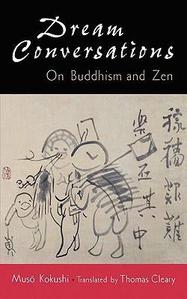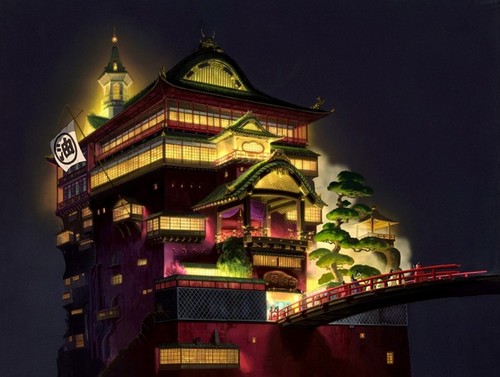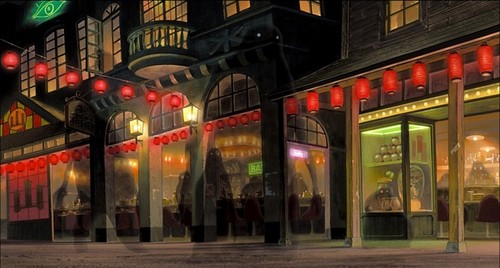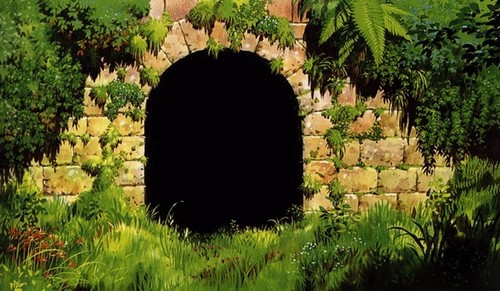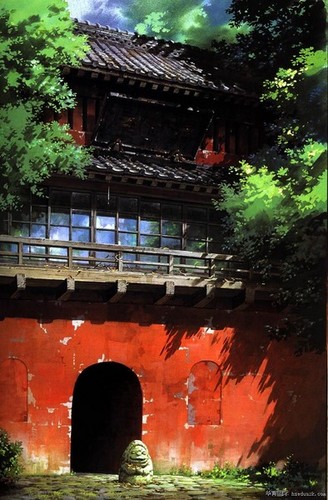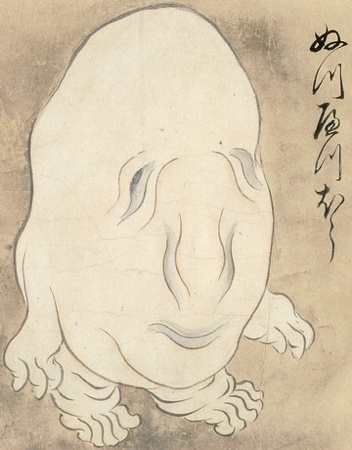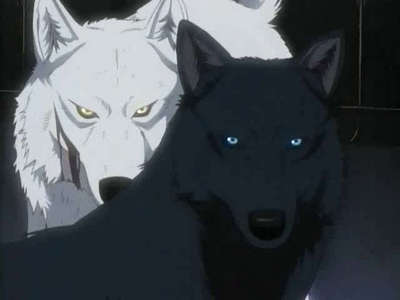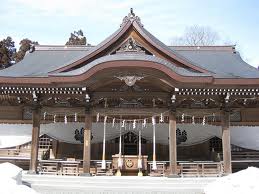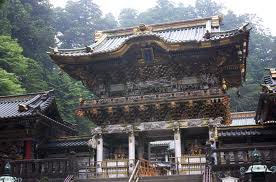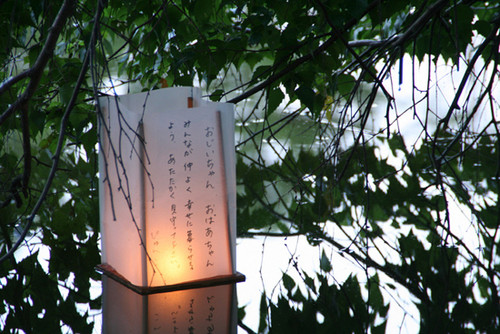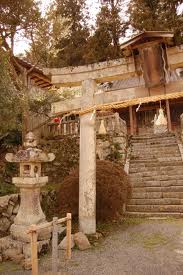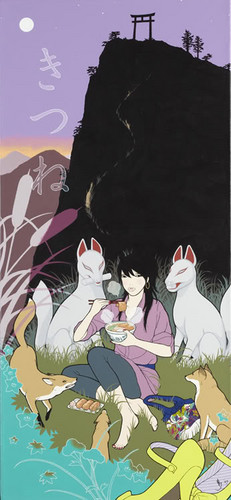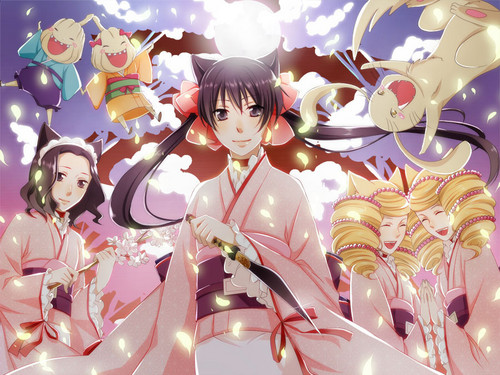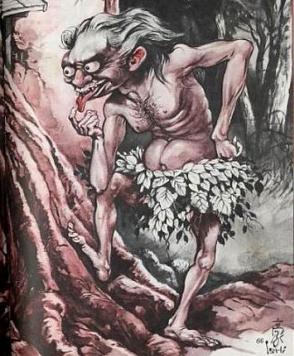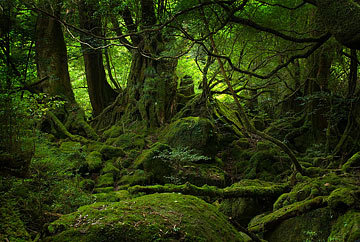[A Rinzai Zen Buddhist monk, teacher, calligraphist, poet, garden designer, & the most famous monk of his time, he is also known as Musō Kokushi, a posthumous name telah diberi him sejak Emperor Go-Daigo
1275 - Ise - Oct. 20, 1351.]
An Obakebanashi
The legend of the jikininki is told in the old Japanese tale of the Buddhist priest Muso Kokushi. It is berkata that Muso was traveling alone through the mountains in the Mino prefecture of Jepun when he Lost his way. It was almost dark when he saw an old anjitsu, the utama of solitary priests, at the bahagian, atas of a bukit and asked the inhabitant if he could stay the night. The inhabitant was an old priest who harshly refused him lodging, however he told him he could find Makanan and a place to sleep in a hamlet nearby.
Muso found the hamlet where the headman welcomed him and promptly supplied him Makanan and a place to sleep. A little before midnight Muso was awakened sejak a young man, who informed him that earlier that day, before he had arrived, his father had died. He had not told Muso earlier as so he would not feel embarrassed atau obliged to participate in ceremonies. However the entire village was now leaving their homes for a nearby village, as it was custom to leave the corpse alone for the night atau bad things would befall the village inhabitants. As a priest, Muso told the young man he would do his duty and perform the burial service and stay the night with the corpse. He was not afraid of the demons atau evil sprits the young man spoke of.
When the young man and the other villagers had left, Muso kneeled sejak the corpse and the offerings and began the service. In the deepest part of a night a shapeless being entered while Muso was in meditation. Muso could not speak atau alih as he watched the shape devour the corpse and the offerings. The seterusnya morning when the villagers had returned, Muso told the young man what had happened. He was not surprised.
He then asked the young man why the priest on the nearby bukit did not do the ceremony. The young man told him there was no priest who lived nearby and there hadn’t been for many years. When Muso spoke of the anjitsu the young man also denied its existence. Muso then departed from the village with proper directions to continue his journey.
Although before he left, he sought out the anjitsu and old priest on the bahagian, atas of the bukit to see if he had been mistaken. He found the bukit and anjitsu easily, and the old priest let him inside this time. The old priest then began to apologize for displaying his true form in front of Muso. He was the shapeless figure who had devoured the corpse in front of him. He explained that he was a jikininki. After living a selfish life as a priest, only caring about the Makanan and clothes his services brought him, he was reborn as a jikininki, doomed to feed upon corpses. He pleaded with Muso to perform a segaki-service so he could escape his horrible existence as a jikininki. All of a sudden the old priest disappeared along with the anjitsu. Muso found himself kneeling in the rumput on the bahagian, atas of a bukit seterusnya to a tombstone of a priest.
....Hearn, Lafcadio (2007). Oriental Ghost Stories. Wordsworth Editions Limited. pp. 55–58.
1275 - Ise - Oct. 20, 1351.]
An Obakebanashi
The legend of the jikininki is told in the old Japanese tale of the Buddhist priest Muso Kokushi. It is berkata that Muso was traveling alone through the mountains in the Mino prefecture of Jepun when he Lost his way. It was almost dark when he saw an old anjitsu, the utama of solitary priests, at the bahagian, atas of a bukit and asked the inhabitant if he could stay the night. The inhabitant was an old priest who harshly refused him lodging, however he told him he could find Makanan and a place to sleep in a hamlet nearby.
Muso found the hamlet where the headman welcomed him and promptly supplied him Makanan and a place to sleep. A little before midnight Muso was awakened sejak a young man, who informed him that earlier that day, before he had arrived, his father had died. He had not told Muso earlier as so he would not feel embarrassed atau obliged to participate in ceremonies. However the entire village was now leaving their homes for a nearby village, as it was custom to leave the corpse alone for the night atau bad things would befall the village inhabitants. As a priest, Muso told the young man he would do his duty and perform the burial service and stay the night with the corpse. He was not afraid of the demons atau evil sprits the young man spoke of.
When the young man and the other villagers had left, Muso kneeled sejak the corpse and the offerings and began the service. In the deepest part of a night a shapeless being entered while Muso was in meditation. Muso could not speak atau alih as he watched the shape devour the corpse and the offerings. The seterusnya morning when the villagers had returned, Muso told the young man what had happened. He was not surprised.
He then asked the young man why the priest on the nearby bukit did not do the ceremony. The young man told him there was no priest who lived nearby and there hadn’t been for many years. When Muso spoke of the anjitsu the young man also denied its existence. Muso then departed from the village with proper directions to continue his journey.
Although before he left, he sought out the anjitsu and old priest on the bahagian, atas of the bukit to see if he had been mistaken. He found the bukit and anjitsu easily, and the old priest let him inside this time. The old priest then began to apologize for displaying his true form in front of Muso. He was the shapeless figure who had devoured the corpse in front of him. He explained that he was a jikininki. After living a selfish life as a priest, only caring about the Makanan and clothes his services brought him, he was reborn as a jikininki, doomed to feed upon corpses. He pleaded with Muso to perform a segaki-service so he could escape his horrible existence as a jikininki. All of a sudden the old priest disappeared along with the anjitsu. Muso found himself kneeling in the rumput on the bahagian, atas of a bukit seterusnya to a tombstone of a priest.
....Hearn, Lafcadio (2007). Oriental Ghost Stories. Wordsworth Editions Limited. pp. 55–58.


